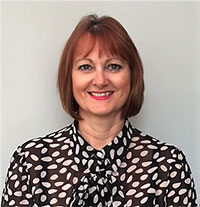A blog by Jayne Carrington
April has arrived. What does that bring to mind for you? April Fools or April Showers? Signs of spring in the air, with warmer days and lighter nights? For many of us, we are beginning to think about and plan for life after lockdown, a year for most of us characterised by uncertainty and flux.
It’s time to spring forward, to think positively about the future – what we need and want and influenced, perhaps, but what may have changed for us over the last twelve months.
We can all be guilty of rushing through life, from one task to another, to the point that our entire lives can appear like a combination of tasks. Often, it’s hard to press pause, to be ‘mindful,’ and to pay tribute to what we have achieved and what matters to us.
 There is well-researched evidence of the benefits of positive thinking1. Having a positive outlook enables us to cope better with stressful situations, which reduces the harmful health effects of stress on our body and heightens our sense of wellbeing2.
There is well-researched evidence of the benefits of positive thinking1. Having a positive outlook enables us to cope better with stressful situations, which reduces the harmful health effects of stress on our body and heightens our sense of wellbeing2.
It’s not always easy to stay positive in the face of challenging and tough times, but with practice, we can learn to alter our mindset and nurture positive thinking.
In fact, around forty-five percent of the choices we make every day are due to our habits3 – and because we are creatures of habit, it makes change difficult, but not impossible. Habits are common tendencies or practices which are often automatic and unconscious. Some are useful; others are not. The good news is that our brain can be trained to learn new habits – repetition and practice can create new neural pathways, new behaviours, and habits4.
Carl Rogers, widely considered to be one of the founding fathers of psychotherapy research, based his life’s work on a fundamental belief in the human potential for change, said “the curious paradox is that when I accept myself just as I am, then I can change.”
Below are a couple of new habits to get you started:
1.) Try to create a few moments of ‘me’ time to relax – The 3-minute breathingspace5
Ideally, make sure you are somewhere you will not be disturbed, although this practice can be done anywhere. You can do it sitting, standing, or even lying down. Adjust your posture, so your shoulders are relaxed, jaw lose, back erect but not arched. Gently close your eyes or gaze softly downwards.
- Awareness – during the first minute, think of a ‘weather check.’
- what are your thoughts?
- what are your feelings?
- what are your bodily sensations?
- your mind will wander – just bring it gently back
- Gathering – during the second minute, focus on the in and out breaths, gently breathing without forcing the breaths. Use the breath as an anchor.
- Expanding – for the third minute, widen your perspective and get a sense of the whole body, the environment around you, any sounds, any smells.
At the end of the three minutes, gently bring yourself back and congratulate yourself for giving yourself this time.
2.) Starting today, at the end of each day, identify three things you are grateful for or happy about. Gratitude is a wonderful feeling of thanks that, when expressed, brings positive emotions to both the giver and the recipient6.
- Write the three things (or more) down in a notepad. Think about what has happened during the day that has made you appreciate yourself or others. It may have been you had a positive meeting or encounter at work finished a critical task and were very pleased with the outcome. You may have made the time to go for a 10-minute walk, resisted the unhealthy snack, drank 6 glasses of water – sometimes seemingly small but hitherto unrecognized achievements or events that, when given time to consider, make you feel happy or grateful.
Spring adds new life and new beauty to our surroundings. There is an air of anticipation that brighter days are here. Together soon we can celebrate good times again, plan events and holidays. We can look forward with gratitude that we have come through some dark, challenging days, and we can look forward to embracing some new habits shaped by our experiences and how we have adapted to change.
We can spring forward.
--------------------------------------------------------------------------------------------------------------------------------------------------------------------------------------------------------------------------------------
 About the author: UnitedHealthcare Global has chosen to work with Jayne Carrington, Health & Wellbeing Consultant & Executive Coach. Jayne has over 30 years of leadership and management experience to draw on, 20 years at Board level, and her consulting and coaching & mentoring approach is based on a wide range of professional roles and achievements, personal resilience and life-long learning.
About the author: UnitedHealthcare Global has chosen to work with Jayne Carrington, Health & Wellbeing Consultant & Executive Coach. Jayne has over 30 years of leadership and management experience to draw on, 20 years at Board level, and her consulting and coaching & mentoring approach is based on a wide range of professional roles and achievements, personal resilience and life-long learning.
Formally trained at the Oxford School of Coaching & Mentoring, Jayne is a fully qualified Coach and Mentor. She has grown two major companies in the mental health and corporate wellbeing sectors and brought innovative solutions through to prominent national and international exposure, including working with the World Economic Forum and Business in the Community. Jayne has contributed to several articles, toolkits, speaking engagements along with other resources to support in the promotion of employee health and wellbeing.
Resources
3 https://sloanreview.mit.edu/article/are-habits-more-powerful-than-decisions-marketers-hope-so/
5 The Mindful Coach (Liz Hall)
6 https://www.health.harvard.edu/healthbeat/giving-thanks-can-make-you-happier
